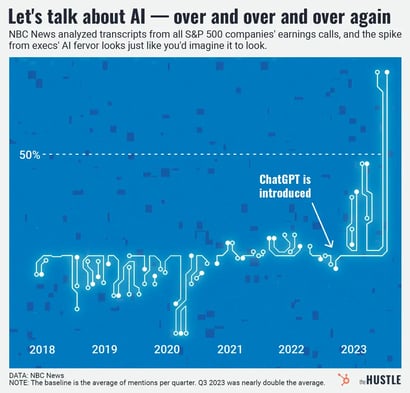If you haven’t announced your plans to “leverage AI,” are you really even a CEO?

An NBC News analysis shows that ~50% of S&P 500 earnings calls have referenced AI since May, putting it about on par with mentions of interest rates and the Federal Reserve.
A whirl through Q3 earnings calls is a fun ride, packed with a lot of this:
- Ulta Beauty’s CEO: “AI is an important part of our business.”
- Leaders at Williams-Sonoma — yep, the kitchenware company — dropped that they’re “early adapters of integrating AI” just minutes into their last call.
Saying you’re working on AI stuff > actually using it
For late-blooming execs who haven’t yet talked a big game about AI, take heart: Falling behind on talking about AI doesn’t necessarily mean falling behind on actually integrating it into a company’s workflow.
- A recent US Census Bureau survey found that only 4.4% of businesses are actively using AI to produce goods or services.
- Some industries are naturally ahead of others: 16.6% of the “information” sector reported recently using AI, compared to just 1.5% and 1.3% of construction and hospitality businesses, respectively.
What’s next?
Assume the slow roll into AI adoption will stay relatively slow for many companies:
- Having only just passed the one-year anniversary of ChatGPT’s introduction, there remain few enterprise tools on the market.
- Executives are still working to understand all of the associated costs of AI adoption.
- Acquiring AI talent can be an uphill climb; there are only so many pros in the emerging field, raising salaries and competition.
Plus, with the European Union reaching an agreement on its AI Act this weekend, more regulatory roadblocks have emerged. The legislation will limit AI adoption for entire European industries, like water and energy, while the EU’s new transparency requirements could slow development for companies like OpenAI.
The great news for executives: Even if you’re only talking about AI barriers, you’re still bound to hit your “AI” mention quota.
Ai










